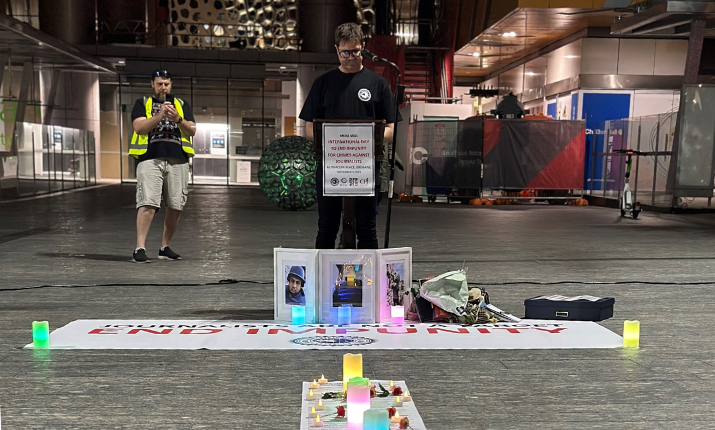Speech by MEAA Federal President Michael Balk on International Day to End Impunity for Crimes Against Journalists
MEAA Federal President Michael Balk delivered this speech at a vigil to mark International Day to End Impunity for Crimes Against Journalists in Brisbane on November 2, 2024.
This vigil is being held today to mark the 10th annual International Day to End Impunity for Crimes Against Journalists.
This date was first proclaimed by the United Nations in 2014 and is commemorated ever year on November 2 to bring attention to the dangers journalists face in bringing the news to us, the public, in many parts of the world, and to seek justice against those who have committed crimes against journalists.
Powerful forces often seek to suppress the truth by intimidating, bullying, harassing or using violence against journalists.
Sometimes journalists are deliberately killed just for doing their jobs.
We have experience of that in Australia. Those responsible for the murders by Indonesian soldiers of the Balibo Five and Roger East in Timor Leste in 1975 have never been brought to justice. Nor the men who ordered the murder of Juanita Nielsen also in 1975. Or Tony Joyce, Paul Moran … the list goes on.
Fortunately, violence is rarely used against journalists in this country.
But that is not the case in many other parts of the world.
According to the authoritative New York-based Committee to Protect Journalists, 87 journalists and media workers have been killed this year. That follows 98 deaths last year.
Since The International Day to End Impunity for Crimes Against Journalist was first commemorated in 2014, 839 journalists and media workers have lost their lives – and according to the CPJ, nearly 80% of these killings have gone unpunished.
It will surprise no-one that the majority of deaths over the past two years have been Palestinian journalists.
Again referring to the CPJ, as of the start of this month at least 134 journalists and media workers were among the more than tens of thousands killed in Gaza, the West Bank, Israel, and Lebanon since the war began, making it the deadliest period for journalists since CPJ began gathering data in 1992.
126 of the dead journalists – 94% – have been Palestinian. That represents about one-in-10 of the Palestinian territory’s pre-war journalism workforce. Then there are another 41 who have been injured and two reported missing.
Many Palestinian journalists have died alongside family members sheltering from Israeli bombs. There is credible evidence that Palestinian journalists have been deliberately targeted. Those who have survived have often lost family to Israeli bombs or bullets.
Global organisations have repeatedly called on Israel to respect international law that decrees that journalists are non-combatants in war zones, and utmost effort must be taken to ensure they are not military targets.
Israel shrugs this off with statements that leave more questions than they answer.
It is for these reasons that Israel has this year been included in the CPJ’s Global Impunity Index; the first time in its 16-year history. This metric measures unsolved murders in proportion to a country’s population. Israel sits just below Haiti at number two on the index.
So today, as we mourn all journalists who have been killed over the past two years, we also call on Israel to respect the role of journalists, to abide by international law, and not to target journalists and media workers.
Despite the dozens of their colleagues who have lost their lives, there are still hundreds of journalists in Palestine who courageously continue to go about their work. To them we are immensely grateful because with all foreign media effectively banned by Israel from entering Gaza, they are the eyes and ears of the world. They bear witness to the atrocities and the humanitarian crisis that continues to unfold.
Those journalists who remain face enormous hurdles in covering the conflict, including the constant risk of more Israeli airstrikes, homelessness, and lack of food, water and other supplies. Even basic tools of the trade like mobile phone chargers and SD cards for cameras are scarce.
Today, MEAA’s Media Safety & Solidarity Fund is launching a new fundraising appeal for Palestinian media workers.
Donations will provide shelter, food and clothing for journalists and their families, along with safety equipment for journalists, as requested by the Palestinian Journalists Syndicate.
Earlier this year, the MSSF raised almost $17,000 from individual donations for basic food provisions and hygiene kits which were distributed by the PJS.
So, with a harsh winter approaching, the PJS has asked media unions around the world for more help.
A QR code will be passed around during this vigil which you can use to make a direct donation to the fundraising appeal. Or you can go to the MEAA website – MEAA.ORG – and follow the links there.
I’d now like to ask all in attendance to join in a minute’s silence – to remember the journalists and media workers who have been killed in the line of duty; doing their work – journalism.
